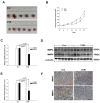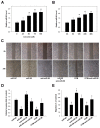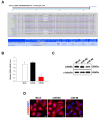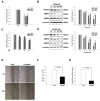Curcumin Inhibits LIN-28A through the Activation of miRNA-98 in the Lung Cancer Cell Line A549
- PMID: 28587210
- PMCID: PMC6152786
- DOI: 10.3390/molecules22060929
Curcumin Inhibits LIN-28A through the Activation of miRNA-98 in the Lung Cancer Cell Line A549
Abstract
Metastasis is common in lung cancer and is associated with poor clinical outcomes and increased mortality. Curcumin is a natural anti-cancer agent that inhibits the metastasis of various cancers by modulating the expression of micro (mi) RNAs such as miR-98, which acts as a tumor suppressor. This study investigated the effect of curcumin on miR-98 expression and in vitro cell line growth and invasiveness in lung cancer. Curcumin treatment enhanced the expression of miR-98 and reduced that of the miR-98 target gene LIN28A as well as matrix metalloproteinase (MMP) 2 and MMP9 in vitro and in vivo. MiR-98 overexpression suppressed lung cancer cell migration and invasion by inhibiting LIN28A-induced MMP2 and MMP9 expression. Meanwhile, LIN28A level was downregulated by overexpression of miR-98 mimic. Induction of miR-98 by curcumin treatment suppressed MMP2 and MMP9 by targeting LIN28A. These findings provide insight into the mechanisms by which curcumin suppresses lung cancer cell line growth in vitro and in vivo and invasiveness in vitro.
Keywords: LIN28A; MMP; curcumin; lung cancer; metastasis; miR-98.
Conflict of interest statement
The authors declare no conflict of interest. The founding sponsors had no role in the design of the study; in the collection, analyses, or interpretation of data; in the writing of the manuscript, and in the decision to publish the results.
Figures





Similar articles
-
miR-133b Inhibits Cell Growth, Migration, and Invasion by Targeting MMP9 in Non-Small Cell Lung Cancer.Oncol Res. 2017 Aug 7;25(7):1109-1116. doi: 10.3727/096504016X14800889609439. Epub 2016 Nov 29. Oncol Res. 2017. PMID: 27938481 Free PMC article.
-
Curcumin inhibits the invasion of lung cancer cells by modulating the PKCα/Nox-2/ROS/ATF-2/MMP-9 signaling pathway.Oncol Rep. 2015 Aug;34(2):691-8. doi: 10.3892/or.2015.4044. Epub 2015 Jun 9. Oncol Rep. 2015. PMID: 26059056
-
Inhibition of miR-24 suppresses malignancy of human non-small cell lung cancer cells by targeting WWOX in vitro and in vivo.Thorac Cancer. 2018 Dec;9(12):1583-1593. doi: 10.1111/1759-7714.12824. Epub 2018 Oct 11. Thorac Cancer. 2018. PMID: 30307120 Free PMC article.
-
The Association Between Anti-Neoplastic Effects of Curcumin and Urogenital Cancers: A Systematic Review.Biomed Res Int. 2024 Oct 15;2024:9347381. doi: 10.1155/2024/9347381. eCollection 2024. Biomed Res Int. 2024. PMID: 39445208 Free PMC article.
-
Curcumin May Prevent Basement Membrane Disassembly by Matrix Metalloproteinases and Progression of the Bladder Cancer.Nutrients. 2021 Dec 23;14(1):32. doi: 10.3390/nu14010032. Nutrients. 2021. PMID: 35010907 Free PMC article. Review.
Cited by
-
Inhibition of Cancer Development by Natural Plant Polyphenols: Molecular Mechanisms.Int J Mol Sci. 2023 Jun 26;24(13):10663. doi: 10.3390/ijms241310663. Int J Mol Sci. 2023. PMID: 37445850 Free PMC article. Review.
-
Curcumin Inhibits the Migration and Invasion of Non-Small-Cell Lung Cancer Cells Through Radiation-Induced Suppression of Epithelial-Mesenchymal Transition and Soluble E-Cadherin Expression.Technol Cancer Res Treat. 2020 Jan-Dec;19:1533033820947485. doi: 10.1177/1533033820947485. Technol Cancer Res Treat. 2020. Retraction in: Technol Cancer Res Treat. 2024 Jan-Dec;23:15330338241257888. doi: 10.1177/15330338241257888. PMID: 33124505 Free PMC article. Retracted.
-
Induction of Apoptosis and Regulation of MicroRNA Expression by (2E,6E)-2,6-bis-(4-hydroxy-3-methoxybenzylidene)-cyclohexanone (BHMC) Treatment on MCF-7 Breast Cancer Cells.Molecules. 2021 Feb 26;26(5):1277. doi: 10.3390/molecules26051277. Molecules. 2021. PMID: 33652854 Free PMC article.
-
Connection between Radiation-Regulating Functions of Natural Products and miRNAs Targeting Radiomodulation and Exosome Biogenesis.Int J Mol Sci. 2023 Aug 4;24(15):12449. doi: 10.3390/ijms241512449. Int J Mol Sci. 2023. PMID: 37569824 Free PMC article. Review.
-
Potential Mechanisms of Action of Curcumin for Cancer Prevention: Focus on Cellular Signaling Pathways and miRNAs.Int J Biol Sci. 2019 May 7;15(6):1200-1214. doi: 10.7150/ijbs.33710. eCollection 2019. Int J Biol Sci. 2019. PMID: 31223280 Free PMC article. Review.
References
-
- Crawford S.E., Stellmach V., Ranalli M., Huang X., Huang L., Volpert O., De Vries G.H., Abramson L.P., Bouck N. Pigment epithelium-derived factor (PEDF) in neuroblastoma: A multifunctional mediator of Schwann cell antitumor activity. J. Cell Sci. 2001;114:4421–4428. - PubMed
MeSH terms
Substances
LinkOut - more resources
Full Text Sources
Other Literature Sources
Medical
Research Materials
Miscellaneous

